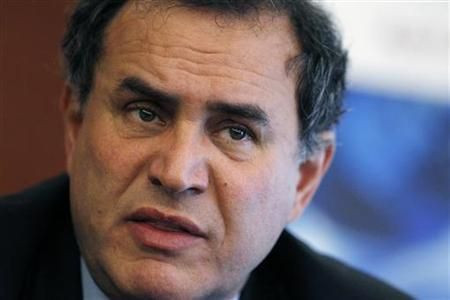Roubini lists the five causes of financial crises

Some individuals – like myself and a few other students of crises in the recent cycle – are able to predict the financial storm well in advance, wrote Nouriel Roubini, co-founder of Roubini Global Economics, in the book the Wall Street: The Collector's Edition.
Roubini is perhaps the most recognizable economist to have clearly predicted the 2007-2010 global financial crisis.
He said all financial crises are predictable events with common elements and causes.
According to Roubini, the five causes are :
1) Easy monetary policy
2) Lax regulatory supervision
3) Excessive risk taking by the financial sector
4) Excessive debt accumulation
5) The delusion that asset bubbles can last forever
The last three U.S. financial crises and ensuing recessions were more similar than different and were caused by a combination of those factors, said Roubini.
In 1980s, junk bonds and the real estate bubble led to the savings and loan crisis and a recession followed in the early 1990s.
In the 1990s, the tech bubble led to the stock market crash and a recession followed in the 2000-2001 period.
In the 2000s, the housing bubble led to the global financial crisis and recession of 2007-2010.
If such boom-and-bust patterns are repeated over and over again, and with striking similarity, why do most people fail to see them?
One reason is that while a bubble lasts, things are good for many people, said Roubini.
For example, during the 2000s housing bubble, consumers were able to live beyond their means, politicians took credit for economic prosperity and were re-elected, Wall Street was making record profits, ratings agencies were paid handsomely to give fancy financial instruments their stamps of approval, and regulators were subject to regulatory capture (which is a polite word for bribery, said Roubini).
Human beings react to financial incentives, and greed has caused and driven asset and credit bubbles for centuries, said Roubini.
To fix the problem, he recommends many rules, regulations, and reforms that would fundamentally change the current financial system.
Some issues Roubini wants to address include:
1) short-term incentives that encourage excessive risk-taking
2) conflicts of interest in large financial institutions
3) the lack of shareholders' ability to rein in publicly-traded financial companies
4) distortions caused by the too big too fail mentality
History may support Roubini's recommendations.
After the Great Depression of the 1930s, U.S. legislators enacted a series of stringent laws that severely clamped down on Wall Street. Those laws were largely in place until the deregulation that started in the 1970s.
For example, Wall Street firms were eventually allowed to go public and banks were allowed to combine investment banking and commercial banking activities.
Research by Professor Carmen Reinhart and Kenneth Rogoff showed that the 1940s to the late 1970s period was the only episode of global banking stability in the past 200 years.
Since deregulation, however, the U.S. (and global) economy and financial sector have been characterized by a series of financial crises, government bailouts, and record Wall Street compensation.
All this culminated in the 2007-2010 global financial meltdown.
© Copyright IBTimes 2024. All rights reserved.





















